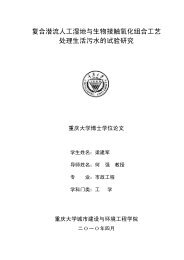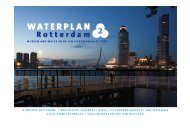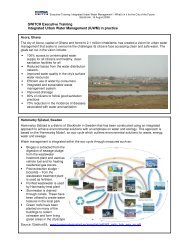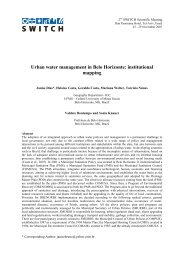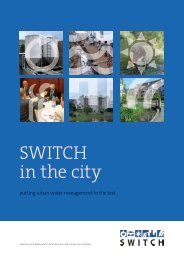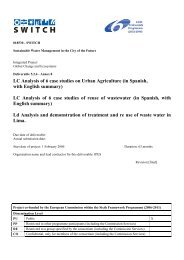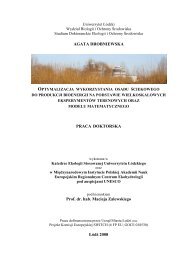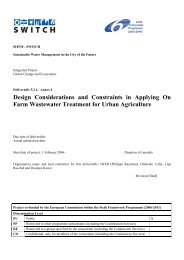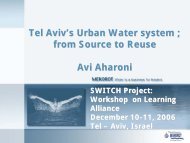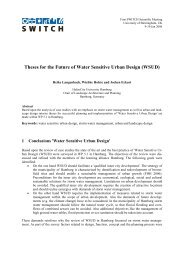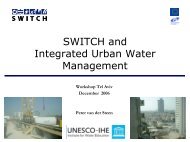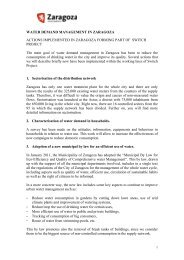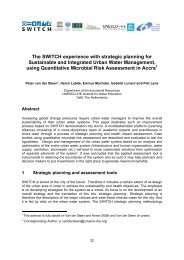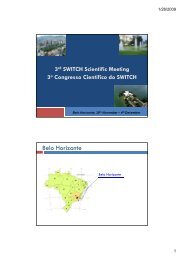Systems Analysis of Zaragoza Urban Water - SWITCH - Managing ...
Systems Analysis of Zaragoza Urban Water - SWITCH - Managing ...
Systems Analysis of Zaragoza Urban Water - SWITCH - Managing ...
Create successful ePaper yourself
Turn your PDF publications into a flip-book with our unique Google optimized e-Paper software.
<strong>Systems</strong> <strong>Analysis</strong> <strong>of</strong> <strong>Zaragoza</strong> UWS<br />
Guillermo Penagos<br />
A likely scenario for the year 2020, considering different levels <strong>of</strong> water recycling was<br />
analyzed here, and the probable performance <strong>of</strong> the UWS under the most negative<br />
predictions for climate change and upstream water extraction was assessed by<br />
means <strong>of</strong> the sustainability indicators previously presented and discussed.<br />
According to the scenario assessed here, water from Yesa reservoir will remain<br />
available for the city and it will be able to fulfill all requirements during the next 50<br />
years, even under worst possible scenario for climate change and irrigation.<br />
However, as consequence <strong>of</strong> very low volumes during summer time, coupled with<br />
expected increased radiation and temperature there is some possibility for algal<br />
blooms that might threaten drinking water quality in the years to come. Under this<br />
scenario, water from Ebro River will be even more unsuitable for drinking purposes.<br />
Therefore <strong>Zaragoza</strong> will have to completely relay on the Yesa reservoir to fulfill its<br />
water demand.<br />
In current conditions it seems also that ground water supply for <strong>Zaragoza</strong> is granted.<br />
However the National Irrigation Plan that is about to be implemented has the purpose<br />
<strong>of</strong> upgrading the existing irrigation technology to optimize water use. If increasing<br />
evapotranspiration is also expected due to climate change (Ayala-Carcedo, 2000).<br />
As consequence it is probable that groundwater recharge for <strong>Zaragoza</strong> will not<br />
remain at the current rate, and the water table will probably drop down and ground<br />
water extraction will not be as feasible as now, but this is not possible to know now<br />
since there are no studies about groundwater recharge in this aquifer. Such studies<br />
are urgently required and this is partially the subject <strong>of</strong> the Ebro River Working Group<br />
(2007).<br />
The recycling water strategy proposed here would obviously have a direct benefit<br />
upon water withdrawal. Also a slightly positive effect is expected on energy<br />
consumption and thereby also on CO 2 emissions to the atmosphere. No effect <strong>of</strong> this<br />
strategy is expected on pollution loads to the Ebro River neither to agriculture soil. In<br />
fact if population and industrial activities continue to increase, even under a reduction<br />
<strong>of</strong> water withdrawal scenario, pollution loads to the environment are expected to<br />
increase likewise. Therefore, with current WWT technology and societal behaviors it<br />
will be possible to improve just some aspects <strong>of</strong> the environmental performance <strong>of</strong><br />
the system.<br />
66



